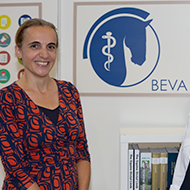
BEVA launches one-stop shop to help navigate equine welfare cases
A practical ‘welfare case toolkit’ has been developed in conjunction with the RSPCA and includes a welfare workflow and quick download guides and welfare case forms.
Being called out to a welfare case to assess immediate veterinary needs is part of an ambulatory vet’s role and he or she may also be required to act as a witness.
“Welfare assessments can sometimes be intimidating and it’s natural to feel vulnerable, particularly when circumstances are difficult”, said Merry Smith, BEVA council member who led the project on behalf of BEVA. “Our new ‘Welfare Case Toolkit’ gives you access to the information and resources, even when you are on the road, to support you in dealing with a welfare case.”
The interactive ‘Welfare Workflow’ provides a step-by-step guide to what happens when a vet is called upon to provide an opinion on the health and welfare of the animals involved. It has been produced in a mobile-friendly format or can be printed out and kept in the car. Supporting the ‘Workflow’ is a series of quick downloads, covering all aspects of the process:
- approach to the welfare case
- letter of instruction
- Section 18 of the Animal Welfare Act (2006) certificate
- witness details sheet
- witness statement form
- RSPCA vet examination form
- guidance notes on how to complete a vet examination welfare case form
Caroline Allen, chief veterinary officer at the RSPCA said: "Vets are absolutely critical to the work of the RSPCA and while we know many vets get a lot of satisfaction from this work saving animals from cruelty and suffering, we know that this work can sometimes be daunting and the law confusing. We are delighted to have worked with BEVA on providing this guidance and hope it is the first step in us providing more support to vets doing this vital work – we literally couldn't do it without you.”
The Welfare Case Toolkit is available free to BEVA members.



 The Federation of Independent Veterinary Practices (FIVP) has announced a third season of its podcast, Practice Matters.
The Federation of Independent Veterinary Practices (FIVP) has announced a third season of its podcast, Practice Matters.